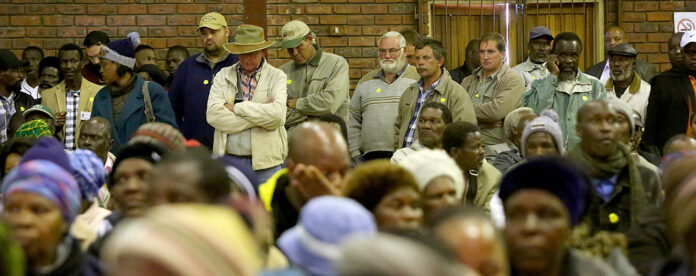South Africa stands at a historical crossroads. The unresolved land question has become a national crisis amid high levels of unemployment, poverty, inequality and uneven spatial development, with the victims of colonisation and apartheid the worst affected.
The resolution of the land question demands a bold, democratic solution. That solution is a referendum, a national decision by the people to bring justice to a country still shackled by the legacy of colonial dispossession and apartheid robbery.
This is why the recent bilateral session between the SACP and Contralesa (Congress of Traditional Leaders of SA) reached an unequivocal resolution: “We will each, and together, drive a national campaign for a land ownership transformation referendum”. All South Africans who believe in justice and equality, including land justice and equitable access, must rally behind this cause.
Since the adoption of the Constitution in 1996, efforts at land restitution, redistribution and tenure security have failed to deliver meaningful transformation. By August 2024, just over 9.2-million hectares had been transferred. While additions have followed, they remain grossly inadequate. Consider that SA spans more than 121-million hectares. The amount redistributed is a drop in the ocean, a fraction of what is justly due.
The 1913 Natives Land Act reserved 87% of land for white ownership, leaving the dispossessed black majority with only 13%. But the crime of land dispossession began long before 1913. It began with the arrival of European colonialists who waged wars of conquest and plunder. Our people, organised into traditional communities and led by traditional leaders, resisted heroically.
A Lerumo (Michael Harmel), in Fifty Fighting Years, exposed the racist falsification of South African history propagated by colonialists and the apartheid National Party. They claimed that white settlers entered a near-empty land peacefully, while Africans were recent arrivals and aggressors. Lerumo rightly denounced this as a BIG LIE. The truth is clear: this land was already occupied by African communities, including the Khoi and San, who had a deep-rooted, historical and economic relationship with it.
The colonialists’ descendants still benefit from land acquired through violence, apartheid legislation and the colonially imposed capitalist market, which reinforced racist race relations, including through the system of white privilege. Yet land restitution remains constrained by the narrow terms of the 1913 cut-off and is further hindered by the state’s uncritical adherence to capitalist market value. The idea that transformation of land ownership must be subject to “willing buyer, willing seller” or capitalist market value has become a constraint. Its return must be driven by justice, redress and reparations.
Restitution has not been completed even within its limited cut-off scope, and there are new order claims that have not be examined. Redistribution has not advanced remarkably either. Security of tenure remains incomplete and does not cover the majority of South Africans. The truth is that none of these programmes have brought us closer to a decisive breakthrough towards land ownership transformation. The pace is dismal. At the current rate, it would take centuries, if ever, to reclaim what was dispossessed.
To appreciate the challenge we face, think about the recent budget. Like all those before, it allocates pitiful sums to land ownership transformation. These resources are dwarfed by the rising cost of land, and they will never meet the demand unless something drastic is done.
This state of affairs must end. To realise this, South Africa needs a national referendum on land ownership transformation to reaffirm the historical truth that land was dispossessed and must be returned as part of reparative justice. This is not a call for chaos. It is a call for justice – peaceful, lawful, democratic justice, led by the will of the people.
Let us be clear: unless we confront the past honestly and act decisively, the land question will continue to haunt South Africa. It will continue to form part of the factors that sustain inequality, mass poverty and undermine reconciliation. Political will has failed. The existing framework has failed. Budgets have failed.
We call upon all South Africans to join the campaign for a land ownership transformation referendum. It is time to correct the crimes of the past and reclaim the future as part of the constitutional imperative to redress the results of past racial discrimination. The referendum is not only a tool of democracy; it is a weapon of liberation.
If you embrace democracy, let the people decide.
• Mapaila is general secretary of the SACP



